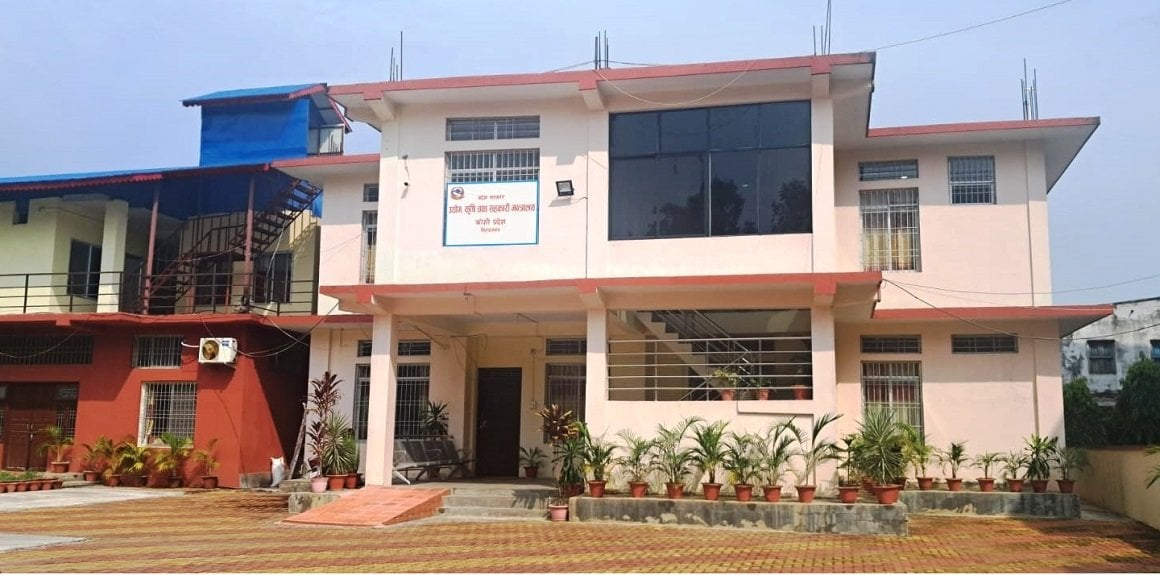Koshi cooperatives at risk: Provincial government fails to tackle problems

Biratnagar, September 25 — Half a dozen cooperatives in the Koshi Province are still facing problems. There is pressure from affected savers to declare these cooperatives troubled and initiate measures for problem resolution.
However, the Koshi provincial government, the relevant parliamentary committee of the provincial assembly, and various ministries and departments do not seem to be giving much attention to solving the cooperatives' issues.
The Machhapuchhre Savings and Credit Cooperative in Biratnagar, the Ambe Savings and Credit Cooperative in Itahari, and the Baraha Savings and Credit Cooperative in Dharan are in dire situations and unable to recover from the crisis. Similarly, the Purba Nepal Multipurpose Cooperative in Kamal Rural Municipality, Jhapa, the Umagauri Agricultural Cooperative in Morang, and the Unnati Savings and Credit Cooperative in Shivasatakshi Municipality, Jhapa, are also facing difficulties.
These mentioned cooperatives are only representative names among those struggling. Many cooperatives in Udayapur, Morang, and Jhapa are also troubled, putting billions of rupees saved by the general public at risk.
The Ministry of Industry, Agriculture, and Cooperatives in Koshi Province has two bodies that oversee regular monitoring and guidance of the cooperative sector. The Koshi Province Registrar Office in Inaruwa and the cooperative monitoring branch of the ministry are responsible for this task.
According to the branch chief, Lilaballabh Chapagain, the ministry has monitored 23 cooperative institutions over the past two years. After monitoring, brief reports have been submitted to the ministry. These reports indicate issues such as arbitrary investments by cooperative directors, general meetings held only on paper, lack of skilled personnel in regulatory bodies, inability to return savings deposited by the public, and failure to recover loans.
The reports also highlighted problems like overvaluing collateral for loan disbursements and not adhering to laws and regulations, such as issuing memberships and loans on the same day.
"Cooperatives cannot hold savings for more than three years, yet they have set savings periods of up to 20 years. The loan terms also extend to 20 years. It's not permissible to grant loans for periods exceeding three years," Chapagain said. "There are arbitrary expenses within the cooperatives. The directors do whatever they want."
He noted that irregularities have been observed where savings were collected door-to-door using passbooks, members were enrolled at home, and loans were also provided at home. "Savings were collected at home, and some members have never even seen the cooperative office. This is also a reason why cooperatives are currently in trouble," he said.
Chapagain indicates that a larger crisis is looming in the cooperative sector. "A more significant crisis is about to emerge. There has been no monitoring of the cooperatives transferred at the municipal level," he stated. "Moreover, there aren't capable personnel for monitoring. There are no staff at the local level who understand why cooperatives are facing difficulties."
He mentioned that responsibilities were assigned without classifying institutions, and it seemed that no one comprehended the situation.
The Oriental Cooperative in Kathmandu, which faced issues in 2070 (2013), has yet to return its savings. The provincial government needs to seriously discuss how savers can quickly recover their funds while addressing the problems faced by cooperatives in Koshi Province. However, no government bodies appear to be acting in this regard so far.
According to Section 84 of the Provincial Cooperative Act, 2019, provisions exist for declaring a cooperative union or institution as troubled. The law allows for the declaration based on recommendations from the provincial cooperative registrar's office, under circumstances such as failure to fulfill obligations or severe financial difficulties.
Once such a declaration is made, provisions are in place to form a management committee to oversee the operations of the troubled union or institution. The committee's chairperson will be the secretary of the ministry responsible for cooperatives, along with one member each appointed from the provincial cooperative union and a cooperative expert nominated by the provincial government. The chief of the provincial cooperative registrar's office will serve as the member secretary.
However, due to difficulties in the committee's functioning and conflicts of interest, the ministry source indicated that plans are underway to replace the secretary of the separate ministry and the chief of the registrar's office with a former administrator and legal professional.
Dr. Lekhraj Dahal, secretary of the Ministry of Industry, Agriculture, and Cooperatives, stated that they are conducting two levels of monitoring through the Koshi provincial government and that assessments are ongoing to check whether actions are being taken based on those evaluations. "We have monitored large savings and credit cooperatives and multipurpose cooperatives in the last fiscal year and the current fiscal year," Secretary Dahal mentioned. "Since amendments to the provincial cooperative act seem necessary, we have recently obtained a mandate from the Koshi provincial cabinet to amend the act. We are now preparing to present it to the provincial assembly."
He explained that the ministry is also preparing amendments because several issues have been identified in the act. "We noticed numerous minor issues in the act. We are trying to amend more than 20 points. One of the significant matters is the amendment of the provision for forming committees for troubled cooperatives," he stated.
The ministry's secretary, Dahal, mentioned that they will only declare cooperatives troubled after the amendments to the act. However, the amendment bill has not yet been tabled in the provincial assembly, and the assembly session has concluded. With the festive season underway, there seems to be no likelihood of convening the assembly before major festivals like Dashain, Tihar, and Chhath. It may take until the month of January for a parliamentary session to be called.
During this period, the issues facing cooperatives appear to be becoming increasingly complex. Secretary Dahal mentioned that discussions are ongoing regarding the introduction of an ordinance to address these issues.
Investment in cooperatives in Koshi province: NPR 145 billion
In Koshi Province, there are 12 cooperatives with assets and liabilities exceeding NPR 1 billion. Among these, 11 cooperatives are located in Jhapa. Additionally, there are 13 cooperatives with transactions between NPR 500 million and NPR 1 billion, 31 cooperatives with transactions between NPR 250 million and NPR 500 million, and 97 cooperatives with transactions between NPR 50 million and NPR 250 million.
There are 1,078 cooperatives regulated under Koshi Province, while 3,651 cooperatives exist under local governments. Among the 1,078 cooperatives under the provincial government, there are 1,215,344 members with share capital amounting to NPR 13.24 billion and savings amounting to NPR 65.59 billion. The loan investment of these cooperatives is NPR 81.13 billion. The total fund of the cooperatives is NPR 9.33 billion, and total assets and liabilities amount to NPR 103.09 billion.
Across all cooperatives in Koshi Province, the total share capital of 2,178,503 share members amounts to NPR 21.52 billion, total savings to NPR 92.25 billion, total funds to NPR 11.59 billion, total loan disbursement to NPR 113.11 billion, resulting in total assets and liabilities of NPR 145.17 billion. Additionally, 14,252 individuals have gained direct employment through these cooperatives.









Leave Comment